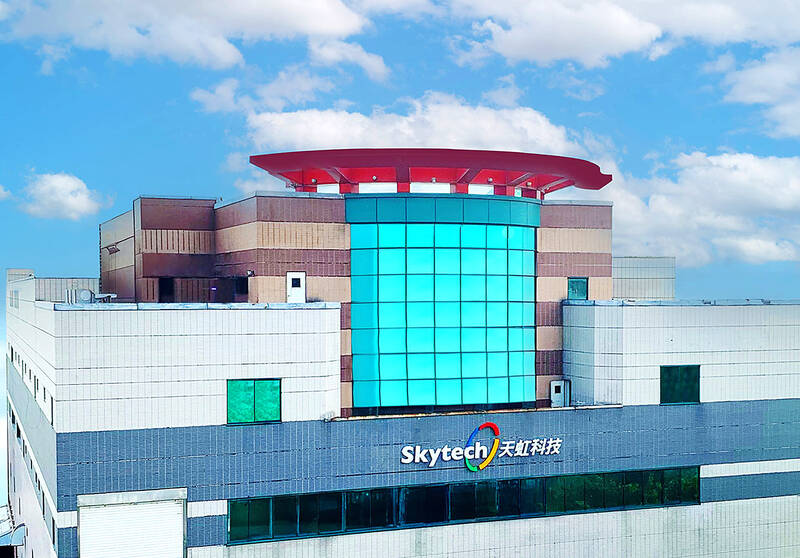Staff Reporter, in HSINCHU COUNTY
Semiconductor equipment manufacturer Skytech Inc (天虹科技) yesterday gave a rosy business outlook for next year on expectations that revenue would grow at least 20 percent year-on-year, thanks to robust demand for advanced chip manufacturing and its new advanced packaging equipment.
The forecast is based on its clear order visibility through the middle of next year, the company said. To satisfy customers’ growing demand, Skytech is expanding its clean room in Hsinchu County’s Hukou Township (湖口). The new clean room would be one-and-half times larger than the original one, when it is ready by the end of this year, it said.

Photo: Screenshot from Skytech Inc’s Web site
“We are upbeat about the 2025 outlook. We expect to see a similar growth pattern as this year, with a growth rate of more than 20 percent,” Skytech CEO George Yi (易錦良) said yesterday. “We have landed new orders from major chipmakers to supply equipment used in advanced packaging technology that is similar to the chip-on-wafer-on-substrate technology.”
Skytech is shipping physical vapor deposition tools, bonders and de-bonders used in advanced packaging technology, Yi said.
Some products are under customer review in preparation for future shipments, he said.
The company also secured new orders to supply atomic layer deposition equipment, which is used in the front-end chip manufacturing process, Yi said.
During the first 10 months of this year, Skytech’s revenue grew 18.33 percent to NT$1.69 billion (US$51.9 million) from NT$1.43 billion a year earlier. With more revenue coming in later this quarter, the company said revenue would climb to an all-time high this quarter.
Skytech is among a few Taiwanese companies that design and produce key equipment used in the chip manufacturing process. It has a broad customer base that includes Taiwan Semiconductor Manufacturing Co (台積電).
Semiconductor equipment made up about 50 percent of Skytech’s total revenue, including advanced front-end chip manufacturing equipment and packaging equipment, which accounted for about 20 percent of the firm’s total revenue.
Another half of revenue came from supplying components and parts to chipmakers, chip testing and packaging service providers, and other vendors, the firm said.
During the first three quarters, Skytech’s net profit soared 64.15 percent year-over-year to NT$261 million, from NT$159 million during the same period last year. That translated into earnings per share of NT$3.87, up from NT$2.62 in the same period a year earlier.
As Skytech has a 30-percent exposure to the Chinese market, it is closely monitoring how the geopolitical tension changes. Currently, local semiconductor equipment makers are not subject to any export ban yet.

In Italy’s storied gold-making hubs, jewelers are reworking their designs to trim gold content as they race to blunt the effect of record prices and appeal to shoppers watching their budgets. Gold prices hit a record high on Thursday, surging near US$5,600 an ounce, more than double a year ago as geopolitical concerns and jitters over trade pushed investors toward the safe-haven asset. The rally is putting undue pressure on small artisans as they face mounting demands from customers, including international brands, to produce cheaper items, from signature pieces to wedding rings, according to interviews with four independent jewelers in Italy’s main

Japanese Prime Minister Sanae Takaichi has talked up the benefits of a weaker yen in a campaign speech, adopting a tone at odds with her finance ministry, which has refused to rule out any options to counter excessive foreign exchange volatility. Takaichi later softened her stance, saying she did not have a preference for the yen’s direction. “People say the weak yen is bad right now, but for export industries, it’s a major opportunity,” Takaichi said on Saturday at a rally for Liberal Democratic Party candidate Daishiro Yamagiwa in Kanagawa Prefecture ahead of a snap election on Sunday. “Whether it’s selling food or

CONCERNS: Tech companies investing in AI businesses that purchase their products have raised questions among investors that they are artificially propping up demand Nvidia Corp chief executive officer Jensen Huang (黃仁勳) on Saturday said that the company would be participating in OpenAI’s latest funding round, describing it as potentially “the largest investment we’ve ever made.” “We will invest a great deal of money,” Huang told reporters while visiting Taipei. “I believe in OpenAI. The work that they do is incredible. They’re one of the most consequential companies of our time.” Huang did not say exactly how much Nvidia might contribute, but described the investment as “huge.” “Let Sam announce how much he’s going to raise — it’s for him to decide,” Huang said, referring to OpenAI

The global server market is expected to grow 12.8 percent annually this year, with artificial intelligence (AI) servers projected to account for 16.5 percent, driven by continued investment in AI infrastructure by major cloud service providers (CSPs), market researcher TrendForce Corp (集邦科技) said yesterday. Global AI server shipments this year are expected to increase 28 percent year-on-year to more than 2.7 million units, driven by sustained demand from CSPs and government sovereign cloud projects, TrendForce analyst Frank Kung (龔明德) told the Taipei Times. Demand for GPU-based AI servers, including Nvidia Corp’s GB and Vera Rubin rack systems, is expected to remain high,